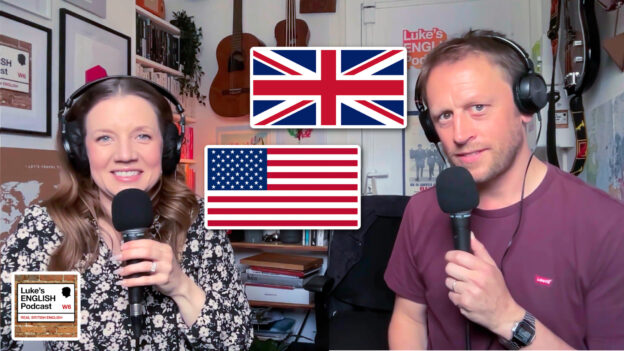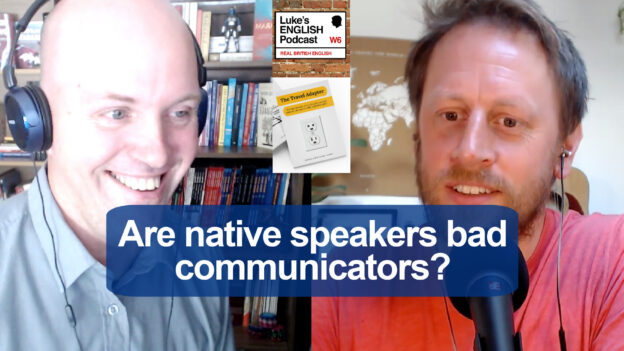Comparing British and American English vocabulary with a fun online quiz. My guest today is American comedian Sarah Donnelly. Video version (of the conversation) available.
[DOWNLOAD]
Video Version (images and text on scree, but no intro or ending comments & summary)
Introduction Transcript
Hello dear listeners,
Hello to all LEPsters in LEPland,
How’s your summer going? OK? I’m on holiday at the moment, but I recorded this earlier and I’ve managed to publish it now. That’s clever, isn’t it? Anyway, I hope your summer is going well and if it’s not summer where you are, I hope that your not-summer is also going well.
Welcome back to LEP.
In this episode, Sarah Donnelly is back on the podcast again.
You might remember Sarah from the other times she’s been on the show, if you are a long-term listener.
Sarah Donnelly is from the circle of friends I have here in Paris who all met each other doing stand up comedy, and that includes Amber and Paul, Sebastian Marx, Fred Eyangoh, Molly Martinez, Sarah Toporoff the Paris Quiz Mistress and plenty of others, many of whom have made appearances on this podcast over the years.
Sarah is originally from North Carolina in the USA. She’s been living in Paris exactly the same length of time as me. We both moved here in September 2012 – by coincidence I mean – we didn’t move here together. But when we did meet, we realised we had both moved here at exactly the same time, which is something we have in common.
The return of Sarah on this podcast is long overdue. As a theme for this episode I thought we could explore the topic of American and British English and so you’ll hear us discussing some of the vocabulary differences while doing a fun online quiz.
We start our conversation by referring to the fact that in my podcastle (the building here where I have my pod-room) there are lots of stairs, because I am on the top floor and also there is a shared toilet in the corridor, which is an old fashioned toilet, meaning it is basically a hole in the ground, rather than a thing you sit on. It’s not a sit down toilet, it’s more of a squatting toilet. That’s probably too much information for you, but there it is. I don’t know if it helps for you to know what kind of toilet we have here at the podcastle. Does that help, to know that? Does that help with your English? I’m telling you that to give you context at the start, so you don’t feel lost.
Anyway, it’s fine. The toilet, I mean. It works. It’s ok. But Sarah calls it a Turkish toilet for some reason (maybe that’s an American thing) whereas in the UK we’re more likely to call that kind of toilet a “French campsite toilet”. Anyway, I thought I’d just clarify that before you listen and wonder what’s going on.
After a bit of rambling about toilets, recording podcasts while sitting on the toilet, different types of toilet, old fashioned toilets and so on. After that toilet talk, Sarah and I get into that online quiz about British and American English.
So the main thing here is to compare some vocabulary differences between British and American English. You can learn some different vocab, and also just listen and compare these two varieties of English.
Listen carefully to hear our specific comments and to learn the subtleties of these differences. You’ll know some of them already, because some of these differences are very well known, but I bet there will also be some new things for you to pick up too.
I’ll sum up at the end of the conversation by the way – I’ll quickly summarise the vocab and the differences, and I will also give some comments about whether you should learn British or American English (which variety to choose). You will find notes and a transcript for the intro part and parts of the ending on the page for this episode on my website. You’re welcome.
I don’t need to say much more here, except that there is a video version of this on YouTube with the quiz questions shown on the screen. You could watch that too, but of course on YouTube you don’t get this wonderful introduction that you’re hearing now, or the bit where I ramble at the end. So there. That’s the advantage of being an audio LEPster in audioland (which is the most populated region of LEPland by the way). You get more.
Now, I will let you listen to my conversation with Sarah Donnelly, let you compare some American and British English and I will talk to you again a bit on the other side of this conversation, with a summary and some more comments.
But now, let’s get started…
The BuzzFeed quiz we did in this episode, focusing on British and American English
“I’m 99% Positive We Can Guess If You’re American Or British Based On This Word Test”
https://www.buzzfeed.com/sarahaspler/american-or-british-vocabulary-quiz
Ending
Thank you to Sarah. Will it be 4 years until she’s back on the podcast again? No, I must invite her back sooner than that.
By the way, you can follow Sarah on Instagram where she posts various comedy video clips there and she is very funny. She’s a great improviser.
View this post on Instagram
Summary of the Vocabulary Differences
UK: Biscuit
USA: Cookie
But I think a cookie and a biscuit are slightly different. A cookie is bigger and often has chocolate chips in it. Typically American. A biscuit is often smaller and a bit harder or with more crunch to it, and they are usually sold in a tube. Biscuits like that are very popular in the UK and we like to eat them as a snack with a cup of tea or coffee. Popular biscuits are things like the digestive biscuit or rich tea biscuit. In some parts of the USA a biscuit is something else entirely, and is larger and more like a scone (or scone) and is a savoury food eaten with gravy. We don’t have those kinds of biscuit in the UK.
Basically – a cookie is larger and a bit softer and very common in the USA. We have cookies in the UK too, but biscuits are more common.
UK: Petrol
USA: Gas / gasoline
The fuel that we put in our cars. In the UK we call it petrol. In the USA they commonly call it gas or gasoline. They’re wrong. Haha.
UK: Crisps
USA: (Potato) chips
Those snacks made from thin slices of potato which have been roasted and are sold in bags. Those are crisps in the UK and chips in the USA.
But, confusingly, chips in the UK are more like American french fries, but not the same because chips (like with fish and chips) are thicker and chunkier. We have fries in the UK too, but they are thin and the sort of thing you get with a burger at a McDonald’s or something.
Fun fact, french fries originally came from Belgium, so really we should all call them Belgian fries. As far as I know, that is true, but for some reason my spider sense is telling me that right at this moment Jean-Pierre is blowing the dust off his fingers in order to correct me. French people, if I’m wrong about that, feel free to correct me. I’m pretty sure it’s right though.
UK: Flat
USA: Apartment
Generally speaking in the UK we do refer to a home which is part of a larger building, as a flat, although we often use the word apartment too.
The building itself might be a block of flats (especially if it is more modern and contains lots of flats) or a tenement (I think more common in American English and perhaps associated with poorer communities) a condominium is a fairly common word in American English and refers to a block of flats but probably a more expensive one. We also might just say an apartment building.
Of course a house is one single property which has one owner or tenant. A house in the UK can be detached (on its own) semi-detached (with another house attached to it) or terraced (part of a terrace of attached houses in one long row, sometimes the whole street).
The word “home” is just used to refer to a place where someone lives. Anything can be your home – an apartment, a house, a cave, a hole in the ground, a boat, etc…
UK: Sweets
USA: Candy
One thing to note here is that the word “sweets” is plural and countable. So you can have a sweet or some sweets, or “how many sweets?” whereas candy is both countable and uncountable. So you can say “How much candy do you want?” and also “I want some candy” and “Do you want a candy?”.
UK: “The city centre”, the “town centre” or “the centre of town”
USA: Downtown
Downtown can be an adjective “A downtown address” or “in downtown Los Angeles” or an adverb (so you can do something downtown) “I’m going downtown” “An incident happened downtown yesterday”.
Also, that TV show about posh people living in a big house in England with their servants 100 years ago – that’s Downton Abbey and not Downtown Abbey.
UK: The greengrocers / the shop / the local shop
USA: The grocery store
The greengrocers in the UK is a small shop that just sells fruit and vegetables.
For a generic shop that sells lots of things including some fruit and veg maybe, but certainly drinks, snacks, milk, beer, bread etc, a kind of convenience store, we might just call it “the shop” or “the corner shop” or “a convenience store” or a “newsagent” (although that mainly sells newspapers and magazines) or “the local shop”.
A supermarket is a place that sells all kinds of food, including fruit and veg.
UK: Swimming costume
USA: Swimsuit
The clothes you wear when you go swimming. I think British people might also say swimsuit.
Those things that float in the water, probably attached to a rope or cable under the water – perhaps a large plastic ball – that’s a buoy, pronounced “boy” in British English and just pronounced all wrong and weird in American English like “boooeeee”, like David Booooeeee or something.
Bed sheets and stuff
It seems we use more or less the same words for this.
From floor to the top, here are the things on a bed:
- The bed frame
- The mattress
- A fitted sheet which goes over the mattress
- You
- The top sheet which goes between you and
- The duvet, which has a duvet cover on it
- Also: a pillow and a pillow case
A blanket might be made of thick wool and could be added on the top to give an extra layer of warmth in the winter or something.
According to Sarah, a comforter in the USA is a kind of duvet that doesn’t have a cover on it.
That’s all I’ll say for that.
UK: a fringe
USA: bangs
In the UK the word fringe is singular. “I was thinking about getting a fringe. Shall I get a fringe? I think I’ll get a fringe.” In the USA “bangs” is a plural word. “I was thinking about getting bangs. Shall I get bangs? I think I’ll get bangs”.
UK: Peppers (red, green, yellow, orange)
USA: Bell peppers
Other vegetable names which are different:
UK: Courgette
USA: Zucchini
UK: Aubergine
USA: Egg plant (again they’re completely wrong on this. Eggs don’t have plants. What are they thinking? Egg plant. Eggs don’t grow on plants, they come out of chickens’ bums.)
UK: Trousers
USA: Pants
This is a well-known one, and I’ve talked about it plenty of times before.
It’s hilarious, isn’t it, because in the UK pants are our underwear. So funny. 😐
UK: The pavement
USA: The sidewalk
This is the place next to the road where pedestrians walk, and where those people on electric scooters endanger everyone’s lives.
Which version of English should I choose? British or American?
To be honest British and American English are not massively different. It’s mainly just little differences that might seem big when you get into very specific situations – especially if you are a British English speaker who goes to live in the USA or vice versa. So, first of all, don’t worry about it too much because the two versions of the language are mostly the same.
But there are differences – certain vocabulary (hopefully episodes like this can help), but also some spelling and grammar differences. There’s another episode for another time – although I did cover some of the pronunciation differences in an early episode 14. English Mania / British and American English
Also, pronunciation. The accents are fairly different and also certain words can be quite different (like buoy, aluminium, and so on).
The more you listen to spoken English from different places, the more you get a sense of the different sounds.
Feel free to choose whichever one that you like.
If you’re going to live in the USA, learning American English would make sense.
If you’re going to most other places where English is spoken including Canada, Australia, Ireland, New Zealand, South Africa, India and other places – British English spelling and grammar standards are used.
But, American English is probably more widespread than British English because there are just more American people in the world (300,000,000 of them) and because the popular culture is everywhere too – films, TV series, music etc.
So, I suppose it’s up to you.
But at the end of the day – the answer is. Learn British English, it’s just better.
I mean, who says “Booooeeeee” – it’s a buoy.






































